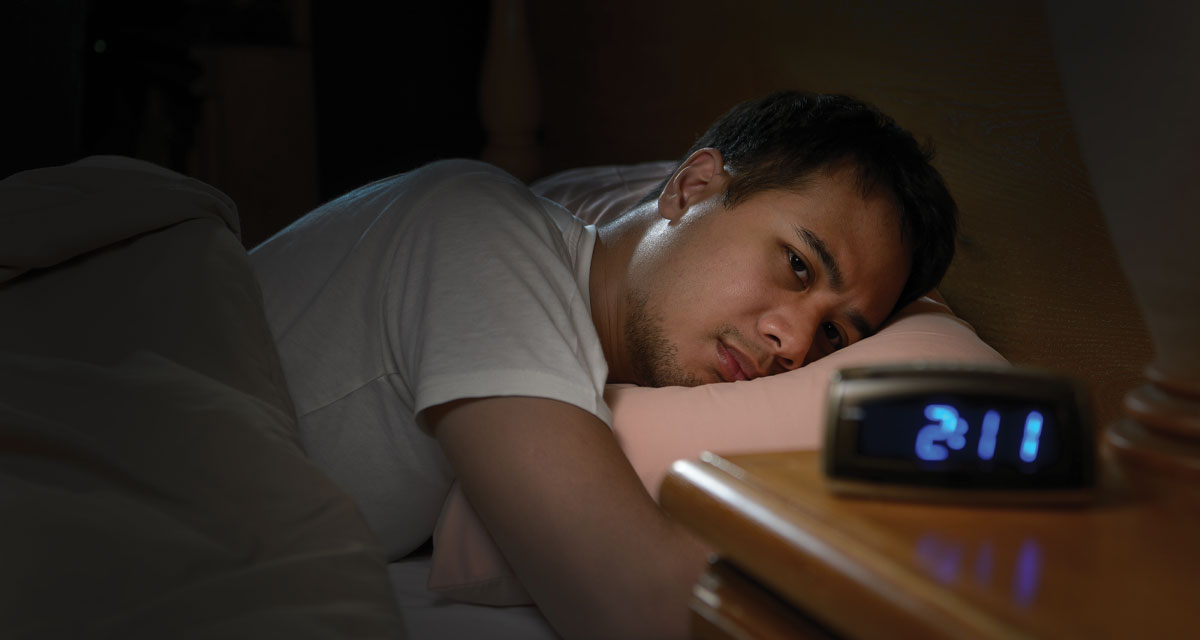The body works to the rhythms of a clock, affecting physical, mental, and behavioral changes within a 24-hour cycle. As the mind sees the dimming of natural light, our circadian rhythm engages the brain to send signals, pulling the body towards sleep. The act of falling asleep occurs at the molecular level. A neurotransmitter travels through the nerve cells and tells the brain to turn off the switch; yet, for some, the brain cannot enter a “homeostatic sleep drive.” While it can shut the body down for a few hours, the internal alarm clock sounds to promote wakefulness.
What is Insomnia?
Insomnia is defined as “A common sleep disorder rendering three out of five people unable to fall asleep, stay asleep, and, if the body wakes, return to sleep.”
There are two types of insomnia:
- Acute: The result of stress or traumatic events affecting sleep patterns for days or weeks.
- Chronic: A long-term pattern of having difficulty falling asleep and remaining asleep. While some people have a history of insufficient sleep, chronic insomnia connects to a wide range of physical and mental health problems. It leads to anxiety and depression, substance abuse, and motor vehicle accidents.
Effects of Disordered Sleep
Adequate levels of sleep are a restorative to the brain function and body. They can foster quick reflexes, clarity of mind, and boost serotonin levels, bringing about states of happiness and energy. Groups of people who habitually get too little sleep are at a higher risk of developing brain and neurodegenerative disorders, such as Parkinson’s disease, Lewy body dementia, and multiple system atrophy. When scientists studied patients with a REM-sleep disorder, the goal was to develop solutions for cognitive health.
Dreams and Memory
Think of sleep as the body’s way to clean and offer an upgrade. The first 90 minutes provide a state of REM sleep, which means rapid eye movement, before the brain lapses into a NREM state of non-rapid eye movement. The brain, whether awake or in a stage of sleep, never stops its activity. Through dreams, the mind can create memories from the day, while processing exchanges of communication, meaning, and emotions. It’s important to ask, “Did I dream?” and think about the vividness of dreams. Even recurring nightmares can help an individual find the right type of treatment.
The Trials of Insomnia
Professionals will ask, “What have you tried?” One person may mention mediation and herbal teas, while another will claim yoga and essential oils resolved the problem. Every person’s internal clock is set differently. There are many options to substitute for prescription medications. Try a natural method.
#1: Weighted Blanket
This is a quilt-like blanket weighing between five and thirty pounds with beads or pellets to distribute the weight evenly within small pockets. Similar to swaddling, which is actually a form of therapy termed “pressure stimulation,” the blanket creates a sense of relaxation for those who suffer from stress, anxiety, or depression. A weighted blanket is an effective solution to improve the quality and quantity of sleep, especially if an individual wakes due to tossing and turning throughout the night.
Tip: Children also benefit from using a weighted blanket. Read the weight requirements to ensure the pressure suits the age of the child.
#2 Melatonin
A pea-sized gland located in the middle of the brain emits a natural hormone called melatonin. As the sun goes down, this pineal gland begins to release melatonin into the blood. For those who do not produce the hormone on their own, a dietary supplement is available over-the-counter. Research shows that it may be beneficial to those with delayed sleep.
Tip: Another natural option is to try CBD capsules or gummies, which combine a full-spectrum hemp extract with melatonin.
#3: “Sleepy Time” Teas
Caffeine-free herbal teas often contain the same ingredients found in sleep supplements. Holding a steeping mug close to the chest, breathing in the aroma of chamomile, valerian, lavender, lemon balm, and spearmint promotes relaxation. Ingesting the tea is a pleasant way to induce sleep. Look for boxes specifically made for nighttime, which may include “Sleepy Time Extra,” “Nightly Calm,” “Sweet Dreams,” or “Bedtime Tea.”
If someone you know is in need of a better night’s sleep, invest time in trying various options, or perhaps combining two. Relaxation exercises, coupled with a natural supplement or herbal tea, can encourage the body to fall into a pattern of consistent deep sleep!



















